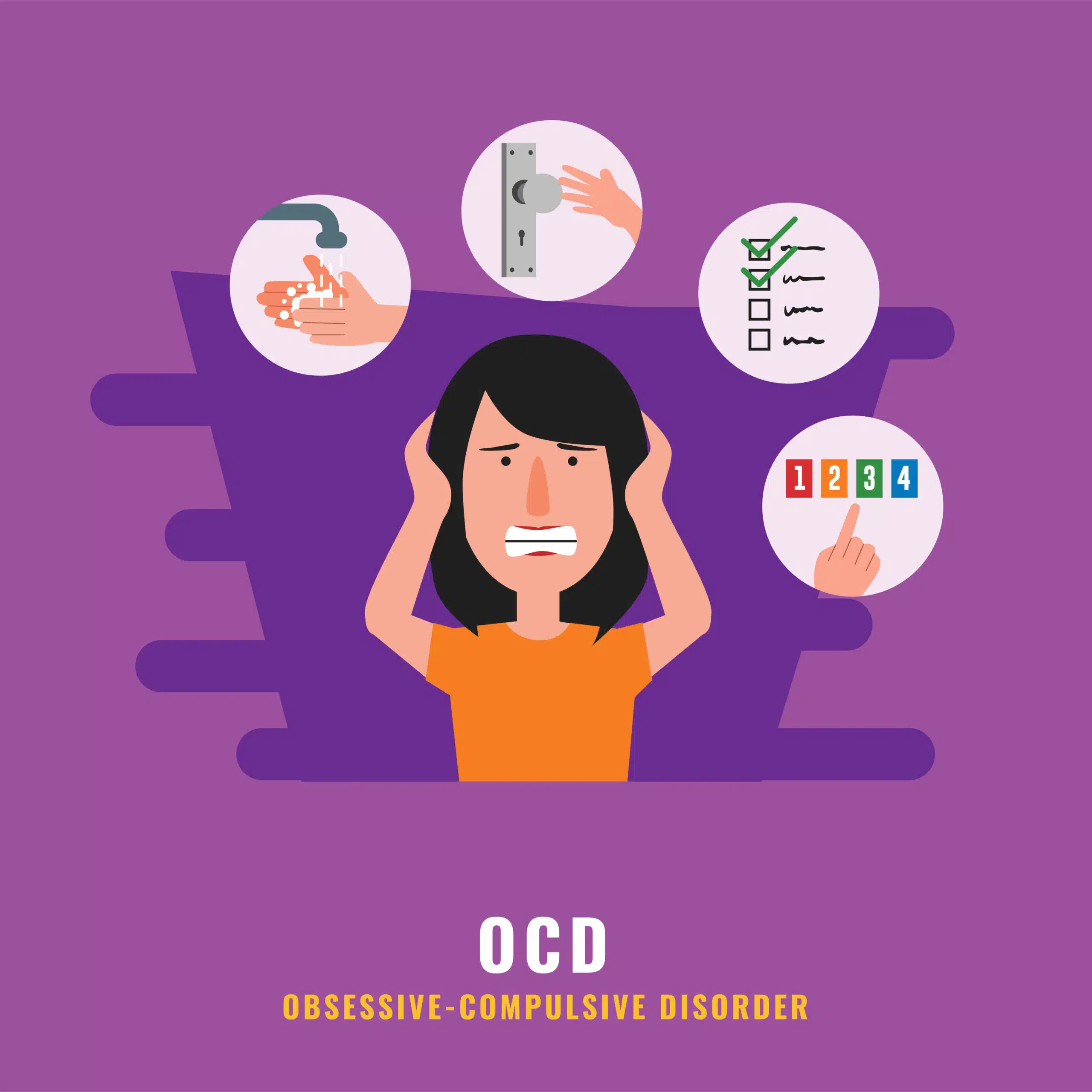
What are OCD symptoms?
Obsessive-Compulsive Disorder is a mental illness that deals with how the brain functions. Fear, worry and sometimes bad thoughts come into a teen’s brain and simply will not go away. No matter what a teen does to try to push them aside, they linger and fester. These thoughts are obsessions that preoccupy or intrude on the mind.
Learn more about our OCD treatment for adolescents or call us now at 888-254-0916.
Intrusive is probably the best description for thoughts that invade a teen’s mind because they not only pop in but set up shop as if they are here to stay. They intrude on every other area of life, forcing other thoughts, ideas, and ultimately, behaviors by the wayside. In other words, per the definition of intrude, they deliberately insert themselves where they are not welcome.
For many teens, intrusive thoughts are not just about the thoughts themselves. As a coping mechanism, or in an attempt to relegate those thoughts to the proper place, the brain sends feelings or urges to other parts of the brain and body. To make themselves feel better, teens will act on these feelings and oftentimes, will feel the need to do it over and over again. These compulsions or rituals become not only habitual but a necessity as part of everyday life.
When Jack was young, he woke in the morning to find a spider in his bed. While most young children are not fond of spiders, no one wants it sleeping with them. Although the spider was removed and none were ever spotted again, the thought or possibility that a spider may be in his bed preoccupies Jack’s mind. Every night before he crawls under the covers, Jack must shake out the sheets, tucking them back in tightly to ensure that no creepy crawlers can get in. If he notices the slightest slack in the sheets, he must start the process all over again. While it is the intrusive thought that there may be a spider that occupies his mind, it is his obsessive behavior that prevents Jack from going to be on time or getting or restful sleep. He believes that with each shaking and remaking of the bed, he can alleviate the obsession and it does help him temporarily until the thoughts become so invasive that he must once again step through the process.
There are several common types of obsessions that teens may experience which cause high levels of anxiety, distress, and urges to control the intrusive thoughts. Troubling thoughts that something bad will happen is common among adolescents. As they are transitioning to adulthood and they are exposed to more and greater risks, teens may become obsessed with this fact that with greater risk brings greater potential for something terrible to happen to them or a loved one. The thoughts become worries and fears that will not go away.
Teens may be fearful of germs or sickness. They may have thoughts that any sickness at all even the common cold may be life-threatening. Negative images of nasty little microbes may invade their mind, causing them to fear for their own health and that of others.
At this very critical time in their lives when hormones are flowing through their bodies, teens may worry about their sexual orientation. Do they like boys? Girls? Both? Are they comfortable and confident in their bodies? Thoughts of possibilities, stereotypes, and criticisms occupy every waking moment causing them to be hyper-focused, self-conscious, and fearful.
Thoughts of a sexual nature may also be prevalent. While it is normal for teenagers to have thoughts and desires, it is when the thoughts take over or become disturbing or violent that there should be cause for concern of obsessive tendencies at work.
Teens may have persistent and ongoing thoughts about everything having a place and being in order. They feel that if things such as desk, backpack, bookshelf, bathroom are not lined up in a particular way, something may happen or the universe will be off-kilter. These ruminations of order and symmetry intrude on and push out all other thoughts and force a teen to focus simply on creating order, routine, and precision.
To combat these troubling and persistent thoughts, teens with OCD may engage in compulsive behavior:
- Constant checking that the door is locked, the alarm is set or the parking brake is on when they are fearful of danger or harm.
- Excessive hand washing or cleaning when the concern of germs or sickness invades their mind.
- Repeating a process or procedure over and over to satisfy a desire or urge even if only temporarily.
- Counting is a common response to OCD symptoms in an attempt to control thoughts and decrease anxiety. They may count floor tiles, the number of lines on a sheet of paper, or even the number of times they open the refrigerator before actually removing what they want.
Take our free OCD test today.
Rebecca, a 15-year-old girl, has been suffering from OCD symptoms for the last two years. She obsesses about sexual things that most people would find pleasurable and completely normal. She worries about bringing harm to little children and getting “dirty” from touching her private parts. Because her peers find it difficult to understand her obsession, she finds that she cannot talk about her negative thoughts with anyone her own age. To lessen her anxiety, she resorts to constant cleaning of herself and her house to wash away the “dirty” thoughts.
OCD symptoms begin to surface between the teenage years and early twenties. While their bodies are going through a massive number of changes, they may also display some of the following OCD symptoms including difficulty in explaining certain actions or behaviors. For example, a teen’s sudden need to wash their hands multiple times in a row or more often than usual.
A teen may suddenly be more worried about issues that may seem illogical or unfounded to most people. In the example above, Rebecca’s concern about harming children appears irrational yet to her, it is a very real worry that intrudes her thought process frequently.
Teens experiencing OCD symptoms may be withdrawn, have difficulty staying on task, may appear to be anti-social, and have trouble managing situations that occur spontaneously or are out of their routine. They may even be aggressive or violent as many teens with OCD experience thoughts of a violent nature.
David is very smart. He plans to study biochemical engineering in college and is looking forward to a typical college experience. Yet he has recently been experiencing OCD symptoms that have kept him from enjoying life and in fact, have infiltrated every area of his thought life. He cannot explain his sudden need to separate himself from the conversation and “lurk” outside of his circle of friends as he ruminates on each thought that passes through his mind. He becomes increasingly withdrawn and isolated as he does not feel comfortable sharing his thoughts with his friends. David’s OCD symptoms are preventing him from enjoying his high school experience let alone how he will manage in college.

OCD symptoms may also be connected to other mental health issues and should not be ignored. Suicidal thoughts and behaviors are a risk associated with OCD if teens believe that they are “crazy”, that they cannot handle their intrusive thoughts and compulsive behaviors. They have to be reassured that treatment is available to help them learn how to manage their OCD symptoms and to control the urges to behave accordingly. Through a combination of psychotherapy and prescribed medication, teens can learn to manage and even overcome OCD.
If you suspect that your teen may be experiencing OCD symptoms, reach out to your teen’s pediatrician for an initial evaluation including a physical examination to rule out any underlying medical issues that may be contributing to the symptoms and behaviors. As a parent, avoid judgment or criticism and instead emphasize that OCD symptoms can be managed with proper treatment and guidance by trained mental health professionals like those at Beachside Treatment Center.
For many teens, their OCD symptoms may be a cause of embarrassment. They may be ashamed of their behaviors which may be deemed as peculiar to their peers. They may not want to share the thoughts that are intruding in their thought life and therefore, it may make discussing their OCD symptoms and treatment options even more difficult. However, if you suspect that your teen may be suffering in silence, it is all the more imperative that you reach out and get your teen the help that they need to control the intrusive thoughts and menacing behaviors.




